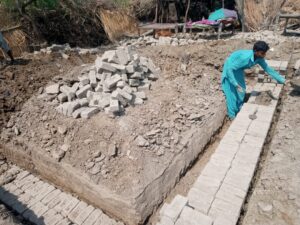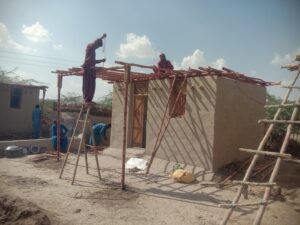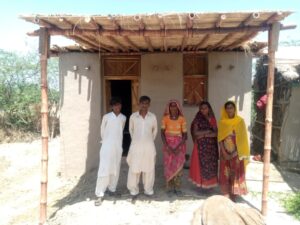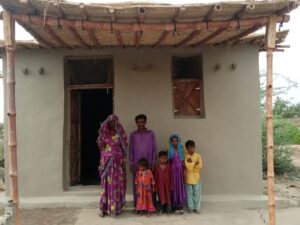Liam O Callaghan was our guest last year at our Mission Month Webinar. He was reporting on the situation in Pakistan following horrific flooding. Mission Month 2023, one year later we asked Liam for an update on the situation.
Pakistan is a country constantly battling a host of problems but even allowing for that 2022 was a disastrous year: – sky-rocketing inflation led to increasing poverty and economic slow-down, constant political instability, extremism and extreme problems from various climate disasters. From March-September, Pakistan experienced six months of endless climate crisis – an unusually early heat wave, melting glaciers, catastrophic monsoon rain and flooding, all of which are linked to climate change. The heat wave struck India, Pakistan and Bangladesh in March and April, causing at least 90 deaths, as well as wheat crop failures, power outages and forest fires. In April, temperatures in a number of parts of southern Pakistan reached 49C, and here in Hyderabad I found it probably the most difficult in my time here. What was exceptional and worrying, is that the heat wave started so early, in March, and continued into May. March and April have never been that hot. Though the heat wave officially ended in early May, nonetheless temperatures were low to mid 40s C right throughout May and June until the rains came.
The rain continued relentlessly for over two months to the end of August; it has been the worst monsoon in decades and the Government declared a national emergency. 33 million people were affected by the flooding, 1,739 people were killed with thousands injured, and it resulted in $14.9 billion worth of damage and over $30 billion worth of economic loss. In addition, over 13,115 kilometres of roads were damaged, 439 bridges destroyed, over 1.1 million livestock lost and according to World Health Organization (WHO), around 8 million flood-affected people need health assistance, including the provision of essential medical supplies and access to essential health care.
Columbans here have responded to this crisis through the generosity of many Columban, family and private donations. We delivered 1,743 relief rations – food packs, mosquito nets, health kits, winter bedding – to families in various areas of Sindh. Responding to the above-mentioned medical needs, the Columbans, from late September until present, have been operating a medical outreach team, and to date, over 8,000 patients have been seen; these are poor families in rural areas where no other medical outreach team has reached.
One of the worst effects was the damage to housing, in the country more than 2.2 million houses were damaged or destroyed, leading to many people being forced to live in tent cities, or camps or on the side of the road. Out of this, 1.5 million were in Sindh alone. As is often the case, it is the poor who are worst affected as their housing was already very fragile to begin with.
Since Christmas we moved into the rehabilitation phase from the initial emergency relief effort. We have started a housing project for poor families whose homes were destroyed, this is made possible by a donation from Columbans in the Oceania Region.
With the help of a construction guide jointly produced by the National Disaster Management Agency (NDMA) of the Pakistan government which provided scientifically tested guidance on low-cost shelter solutions that are flood resistant, compatible with vernacular architecture and indigenous construction techniques, and minimise environmental impacts while delivering the best value for money. It was simply ideal and tailor-made for the situation we found ourselves in.

Building on the first house began on February 1; the weeks prior to this were spent identifying locations and communities effected, undertaking an assessment of the damaged houses and compiling a final list based on the assessment report. Meetings with beneficiaries were held to ensure clarity of the process of demolishing the damaged house and building the new house on that site. Also, locating quality materials to be used – mud bricks, clay, bamboo, timber, a contract with a carpenter for windows and doors, straw and hiring of masons, labourers and carpenters and other support staff. By mid-July, 100 houses have been completed.
We are grateful for the generous support of donors, whose generosity is helping the poorest of the poor to re-build their lives again.





